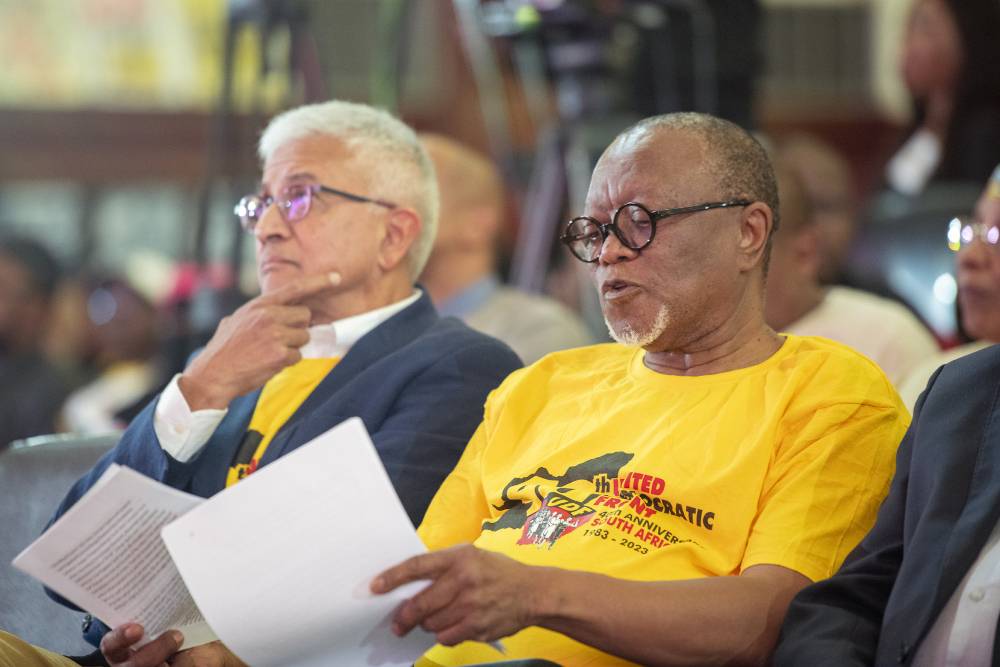Youth attend the UDF 40-year anniversary celebrations. (Photo: Yunus Chamda)
The UDF’s re-emergence stems from a deep-seated concern about the erosion of the values and principles that were its lifeblood
In the heart of South Africa’s tumultuous history, the United Democratic Front (UDF) emerged as a beacon of resistance against the oppressive apartheid regime. On Sunday 20 August 2023, activists from the liberation struggle celebrated the 40th anniversary of the UDF under the stewardship of its last sitting national executive. Popo Molefe, founding UDF member and current convenor of the UDF40 initiative, called for the country’s youth to engage in the upcoming elections.
The resurgence of the UDF is not merely a revival of mass mobilisation as a core organising tool; it signifies a rejuvenation of its core values, a rekindling of its democratic principles, and an impassioned plea to safeguard the hard-fought-for gains of democracy. Significant to this is the UDF’s vision of a united, non-racial, non-sexist, democratic South Africa in which all are equal before the law.
The timing of the UDF’s re-emergence is impacted by South Africa’s evolving political landscape. It stems from a deep-seated concern about the erosion of the values and principles that were the lifeblood of the UDF’s inception. Amid the challenges of the present era, democracy faces a new set of threats, demanding renewed vigilance and collective action.
This “rebirth” transcends the mere restoration of an entity; it seeks to breathe life into the very ethos behind the UDF’s historical significance. It is a clarion call to revitalise the indomitable spirit that united diverse civil society organisations and communities against a common enemy. More than ever, the UD40F aims to address the diminishing resonance of the values it once championed and the steady decline of democratic ideals paid for with countless lives.

UDF40 National Steering Committee members, Vali Moosa and Popo Molefe. (Photo: Yunus Chamda)
Central to this mission is the empowerment of communities and the reawakening of their dormant energies. The UDF40 envisions a movement that galvanises citizens beyond armchair activism and social media engagement. It aspires to reintroduce the very essence of the UDF — grassroots mobilisation, community cohesion and a collective sense of purpose. Through these means, the organisation seeks to ensure that those in positions of power are held accountable to the people they represent.
The historical roots of the UDF go back to the era of apartheid, when it played an instrumental role in unifying South Africans against a regime built on segregation and oppression. The prevailing landscape differs significantly, with established democratic governance and multiple political parties competing for power. However, the UDF40’s focus transcends partisan politics. It pivots toward addressing citizens’ daily struggles and demands transparency and responsibility from those in authority.
While the UDF fought valiantly for civil rights and suffrage during the apartheid era, current endeavours under the UDF40 extend to social and economic rights. These encompass access to basic services such as clean water, quality education and primary healthcare. Moreover, they address the pressing issue of soaring unemployment rates, seeking to breathe life into the promise of a better life for all South Africans.
Critics have questioned the motivations behind the UDF’s re-emergence as the UDF40, citing the tenure of former members who are now in positions of power without substantial changes. In response, the UDF40 recognises both past progress and more recent regressions. It acknowledges that the initial years of democratic governance secured notable gains, but also admits to a decline in ethical leadership and effective governance.
The UDF40 emphasises that their cause transcends the domain of political parties. It underscores the importance of reconnecting with the very fabric of society, reasserting citizens’ role in shaping their destiny. The UDF40 champions active participation — not only during elections — to ensure that the government remains accountable to the people it serves.
As South Africa grapples with the shadow of corruption, the UDF40 recognises the imperative of rebuilding institutions eroded during the state capture era. It lauds the efforts of bodies such as the Special Investigating Unit (SIU) for their dedication in recovering misappropriated funds and combating corruption. Yet, it remains steadfast in its assertion that the journey to an idealised state of accountability is far from complete.
In calling for societal re-engineering, the UDF40 envisions a transformative process that mirrors the UDF’s historical struggle against apartheid. This renaissance seeks to reconstruct the values and principles that guided the nation to liberation. Central to this vision is the empowerment of communities, the amplification of their voices, and the creation of mechanisms that ensure those in power serve and account to the citizens they represent.
Contrasted against other multi-party initiatives, the UDF40 maintains that its focus is rooted in history and unyielding principles. While acknowledging the significance of various efforts, the UDF40’s resolve remains unshaken in its commitment to its original ethos.
In the tapestry of South Africa’s democracy, the re-emergence of the UDF 40 years after its formation signifies a rallying cry against the erosion of democratic values. The UDF40’s mission is far-reaching — it strives to mobilise communities, empower citizens and uphold the ideals for which many died. In essence, the UDF’s resurgence embodies the pursuit of active citizen participation, rekindling the spirit of resistance and holding the torch of democracy high in the complex and ever-evolving South African landscape.
— Popo Molefe, UDF40 National Steering Committee